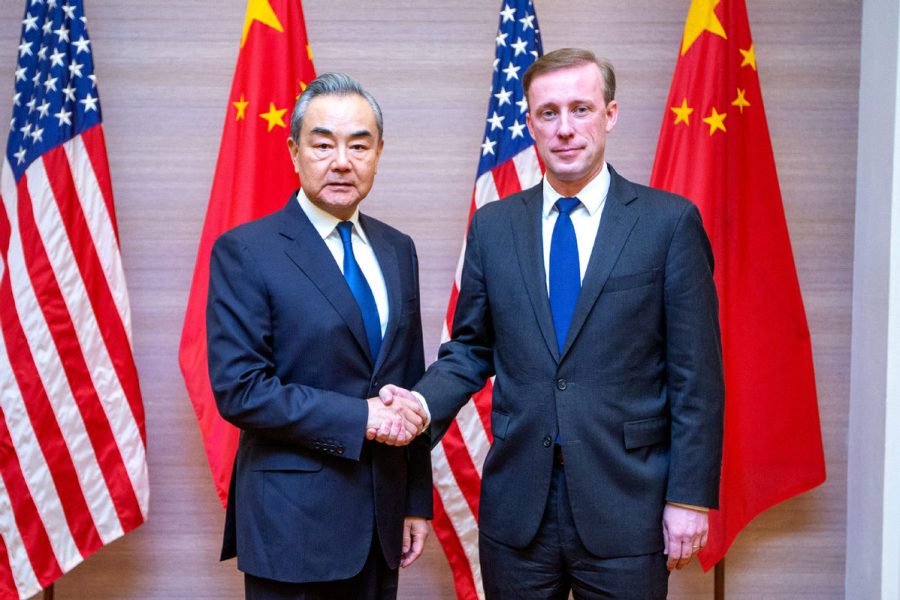In their recent talk, top officials from both sides discussed China’s request for “peaceful reunification” support from Washington. They also laid out specific plans for official meetings and cooperation in fields like artificial intelligence and counternarcotics efforts.
Observers said the improving relations between the world’s top two economies need to continue their momentum of warming, and many other countries have made it clear that they do not want tension regarding the Taiwan Strait, or to have to choose sides between the United States and China on a wide range of topics.
The latest dialogue occurred when Wang Yi, a member of the Political Bureau of the Communist Party of China Central Committee and director of the Office of the Foreign Affairs Commission of the CPC Central Committee, held talks with US National Security Advisor Jake Sullivan on Friday and Saturday in Bangkok, Thailand.
“The two sides had candid, substantive and fruitful strategic communication on rolling out the consensus of the San Francisco meeting of the two heads of state and on the proper handling of important, sensitive issues in China-US relations,” the Foreign Ministry said in a statement after the dialogue.
The two days of talks are part of the recent increase in high-level contacts between Beijing and Washington.
The White House said “the two sides held candid, substantive and constructive discussions on global and regional issues” in a statement released on Saturday.
So far, Wang and Sullivan have held four rounds of one-on-one talks over the course of the past nine months: in Vienna, Austria, in May; in Malta in September; in Washington in October; and in Bangkok.
During the Bangkok talks, Wang defined “Taiwan independence” as “the biggest risk to peace and stability in the Taiwan Strait” and “the biggest challenge to China-US relations”.
He emphasized that the recent elections in the Taiwan region “cannot change the basic fact that Taiwan is a part of China”.
Washington should abide by the one-China principle and the three landmark China-US joint communiques, put into action its commitment to not supporting “Taiwan independence”, and support China’s peaceful reunification, he said.
Calling “Taiwan independence” the biggest challenge to the ties was a way of “urging Washington to keep a clear eye and a cool head”, said Su Xiaohui, deputy director of the Department of American Studies at the China Institute of International Studies.
“The US recently continued sending ships to the Taiwan Strait and has also advanced arm sales to the island. Apparently, it has not given up its approach of playing ‘the Taiwan card’,” she said.
In Bangkok, China made its position clear by warning the US not to further test its bottom line, she said. “This not only matters to China’s national interests, but also to the stability of the relations.”
Prior to the Bangkok talks, Thai Foreign Ministry spokeswoman Kanchana Patarachok said Thailand was confident that the dialogue between China and US would contribute to peace and security in the region and on the global stage.
After the talks, France 24 television commented that the China-US relations “have somewhat stabilized” following the San Francisco summit.
In Bangkok, the two sides confirmed that the two heads of state will “maintain regular contact and provide strategic navigation for the bilateral relations”, the Foreign Ministry said.
In terms of future official cooperation, the two sides agreed to launch a China-US working group on counternarcotics cooperation in the near future, and to hold the first meeting of the China-US intergovernmental dialogue on artificial intelligence this spring.
Beijing and Washington agreed to advance bilateral contacts at all levels in various fields and to take steps to expand people-to-people exchanges.
The two sides agreed to make good use of the current strategic communication channels as well as the dialogue and consultation mechanisms in such areas as diplomacy, military, economy, finance, commerce and tackling climate change.
Also in Bangkok, both sides agreed to hold further discussions on the boundaries between national security and economic activities.
While all countries have national security concerns, such concerns must be legitimate and reasonable, and they should not be part of hype in political and security contexts or be used to contain and suppress the development of other countries, Wang said.
The two sides also discussed international and regional issues such as the Middle East, Ukraine, the Korean Peninsula and the South China Sea.












